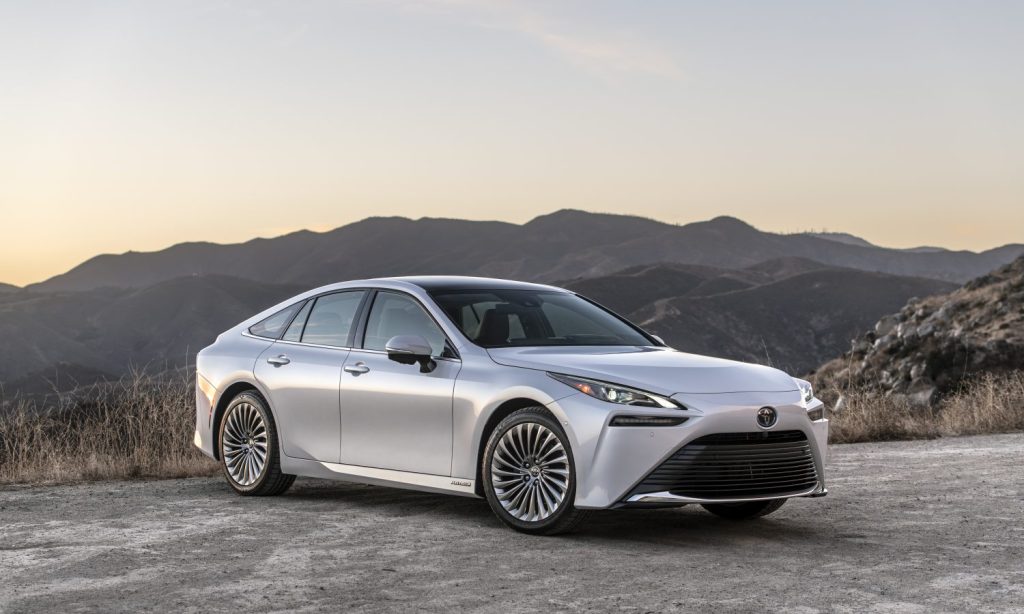Who wants a nearly free car?
If you hurry, you can get $40,000 off a 2023 Toyota Mirai Limited, a fuel-cell vehicle that retails for $66,000. When you factor in the $15,000 in free hydrogen over six years and the available 0% interest loan, the new car would run you just $11,000. That’s how much it costs Toyota to make the vehicle’s fuel cell stack alone, according to the most recent estimate. You buy the fuel cell, Toyota pays for the rest of the car.
It would be a great deal, if you can find the hydrogen to power it.
Toyota’s discount comes on the heels of Shell’s announcement three weeks ago that it’s closing its hydrogen filling stations in California. Granted, the oil company only had seven to begin with (five of which had been out of order), but that still represents more than 10% of the Golden State’s stations, nearly all of which are clustered around Los Angeles and San Francisco. Of those that remain, about a quarter are offline, according to the Hydrogen Fuel Cell Partnership.
California was, and still is, the only state where a fuel cell vehicle makes logistical sense — if you have a filling station nearby that’s operational. And if you squint. And tilted your head.
Just don’t tell Honda, which recently found the time to convert its best-selling CR-V into an automotive equivalent of Frankenstein’s monster: a plug-in hybrid, fuel-cell vehicle.
The crossover’s 17.7 kWh battery provides 29 miles of electric-only range, and once that’s spent, the front-mounted fuel cell starts sipping hydrogen from a pair of carbon-fiber tanks. One tank sits under the rear seat, the other behind, where it takes up an inordinate amount of trunk space.
For all that complexity and compromise, what do you get? A grand total of 270 miles of range, or about the same as a mid-pack electric crossover. Except the EV isn’t restricted to driving around LA or SF.
Now, hydrogen has great potential as a fuel source for many parts of a carbon-free economy, from industrial heat to steel production and long-distance shipping. That’s why so many hydrogen startups are pitching themselves as zero-carbon solutions for those sectors. Electric Hydrogen, which has raised $600 million, is courting steel, power, methanol and ammonia production. Advanced Ionics, 2023’s Startup Battlefield finalist, is aiming the hydrogen from its electrolyzers at ammonia and chemical producers. Hgen is also stalking steel and ammonia. Sense a trend?
Where hydrogen has not found traction is in propelling passenger cars and trucks. Hydrogen production and distribution is still too spotty for Mirai or CR-V owners to take road trips. Plus, despite the Mirai’s fire-sale price, fuel cells aren’t cheap. And if FCEVs are to cut carbon emissions, then they’ll have to run on green hydrogen, not the fossil-fuel derived gray hydrogen that dominates today. Until that happens, they’re only marginally better for the climate than advanced hybrids.
In the near term, it’s pretty clear that zero-emission, light-duty vehicles will need to rely on batteries. So why are Toyota and Honda (and Hyundai and others) still so bullish on hydrogen?
It’s hard to know what happens inside closed boardrooms, but there are a number of reasons why automakers might be pushing fuel cells. The cynical view is that automakers know that hydrogen infrastructure and fuel-cell vehicles won’t be ready for a decade or more, but by touting the drivetrain’s advantages (namely, fast fueling), they can convince EV-wary consumers (and politicians) to embrace fossil-fuel-powered vehicles in the meantime. To some degree, it’s like they wanted to invest in an image of being climate-conscious and technologically innovative while eschewing electric vehicles — the most common vision of a low-emissions transportation future.
A more charitable view is that the companies can’t fight their institutional inertia. Fuel cells might simply excite the companies’ existing engineers and executives. Like internal combustion engines, they’re complex and largely mechanical, fed by pumps and tubes and relieved by exhaust pipes. Plus, most of the design and manufacturing expertise can be kept in house, unlike batteries, which are almost always made by suppliers.
Lastly, automakers might think that consumers won’t switch until filling times match gas-powered vehicles. While EV charging times continue to drop, they’ll probably never hit the five-minute mark like hydrogen can. Automakers might truly believe that an extra five or 10 minutes might be a deal-breaker for most consumers.
Someday, automakers might be proven correct. If today’s hydrogen startups succeed, and if they’re able to build enough capacity to satiate industrial and shipping demand, then it might make sense to start selling fuel-cell vehicles to the masses. Will that day be 10 years from now? Or maybe 20? Let’s put it this way: it’s not currently on anyone’s roadmap.
Correction: This article has been updated to reflect the fact that Toyota’s discount only applies to the Mirai Limited.






























Comment